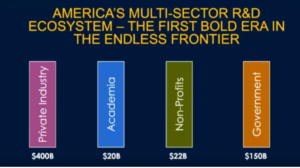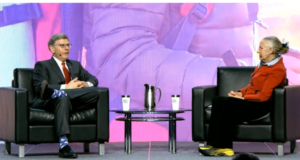December 17, 2019
OSTP Values with Dr. Droegemeier
Posted by Kasia Kornecki
Current Director of the White House Office of Science and Technology Policy (OSTP), Dr. Kelvin Droegemeier, gave the Agency Plenary at AGU’s Fall Meeting on December 12th in San Francisco (video available at AGUGO). Congress created OSTP in 1976 with a broad mandate to advise the President on all-things science and technology: that makes Droegemeier President Trump’s head science advisor. Droegemeier’s talk at AGU was a chance for members to get to know the man behind the Agency, and a chance to learn about the direction and vision of science and technology at the Federal level.
Droegemeier’s session began with a presentation about OSTP priorities, and later transitioned to a Q&A discussion with AGU’s president Dr. Robin Bell. Prior to his appointment at OSTP, Droegemeier had a decorated career as a Professor of Meteorology at University of Oklahoma with expertise in extreme weather patterns, predictive technologies, and data assimilation. He also served two six-year terms on the National Science Board, which oversees the activities of NSF. With a cheery disposition and excited tone, he seemed honored to address the AGU, noting that some of his past students were probably in the audience. “We’re living in an amazing time!” he started, referring to the incredible amount of knowledge and data we have at our fingertips. According to Droegemeier, we are entering a bold new era where “we can tackle problems we never thought before possible.”
OSTP’s mission is to ensure that the US remains a world leader in science and technology, and Droegemeier asserted that advancements in Earth and Space Science are critical to realizing OSTP’s vision for the future. OSTP’s five R&D priority areas are:
1) Security (advanced military capabilities, infrastructure resilience, semiconductors, and critical materials)
2) Industries of the Future (AI, quantum computing, 5G, advanced manufacturing, biological engineering)
3) Energy and Environmental Leadership (energy resources, ocean science and technology, earth system predictability)
4) Health and Bioeconomic Innovation (biomedicine, bioeconomy, health and wellness)
5) Space Exploration (in-space resource utilization, manufacturing and assembly, fuel storage, advanced power and propulsion capabilities)
Since Droegemeier’s expertise is in meteorology, he indicated that Energy and Environmental Leadership was a personal priority for him. He is a strong believer in quantifying Earth system predictability, and finding better ways to collect, use, and share data. He boasted of a recent White House Ocean Summit, where the OSTP Ocean Policy Committee presented its decadal vision for Ocean Science. He also mentioned his support of a 5th National Climate Assessment, although leadership is still TBD.

He likened the scientific enterprise to a jigsaw puzzle: every area of research and technology is just a piece of the puzzle. Everyone is invested in their piece, he said, but it’s his job to zoom out and see the box-top. Droegemeier believes that building strong partnerships between academia, industry, government, and non-profit is the only way to see the big picture – to uncover the box-top. Across all sectors, it is estimated that there is ~$600 billion to invest in innovation. “But people don’t know how to partner effectively,” he said, indicating that OSTP intends to be a resource for assisting multi-sector R&D partnerships blossom.
But building research environments that reflect “American Values” is Droegemeier’s real bread and butter. He said that if we have research environments where people don’t feel safe and welcomed “then we’re really missing the point.” In May of this year, newly under Droegemeier’s direction, OSTP launched the Joint Committee on the Research Environment (JCORE). JCORE’s goal is to address research integrity, safety, inclusivity, and diversity.
When asked about public trust in science, Droegemeier said that the research enterprise generally “enjoys tremendous trust because we operate with integrity.” And that integrity is what affords science “a seat at the table.” He remarked that science is not policy, and science shouldn’t automatically become policy, but that science certainly should have a place in the policymaking process. Staying true to his academic roots, Droegemeier declared that he’s never too busy to have office hours. He encourages people to visit him at his D.C. office where he says he keeps his office open to the public for a few hours every week.
Kasia Kornecki is a Ph.D. chemist and is interested in policy related to research funding, clean energy, and sustainability.



[…] Fonte/Source: https://blogs.agu.org/thebridge/2019/12/17/ostp-values-with-dr-droegemeier/ […]